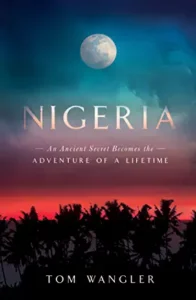Finding inspiration in NIGERIA — Stint in the Peace Corps results in novel 45 years later
By DAVID JASPER The Bulletin, Bend OR
Dec 26, 2019 Updated Jan 29, 2021

Tom Wangler (Nigeria 1974-76)
After Tom Wangler entered the Peace Corps as a 25-year-old in 1974, he thought he might write about his adventures in Africa.
“I had full intentions of writing a book when I got back,” said Wangler, of Bend. “It took me a while.”
Four decades later, Wangler has realized his dream with the publication of his first novel, Nigeria: An Ancient Secret Becomes the Adventure of a Lifetime, a thriller about a Peace Corps volunteer who goes missing while searching for a hidden oasis, triggering a desperate search and rescue mission. Inspired by events Wangler witnessed while in Africa 45 years ago, it was published earlier this month by Bend’s Dancing Moon Press.
Today, Wangler serves as education program coordinator at the Oregon Youth Challenge Program, an alternative high school for at-risk youth run by the National Guard. But at 25, he was a teacher who decided to join the Peace Corps after a couple of years of teaching.
“I was kind of burned out on the politics of the public school system after two years — can you believe that?” Wangler said, chuckling. “And so I just wanted to do something different, and saw an ad in a newspaper looking for coaches to go to Africa.”
At the time, the Peace Corps sought potential coaches to help identify and train athletes for the 1976 Summer Olympics, he said.
“I said, ‘That sounds like an awesome opportunity,’” he said. The application packet took him a week to complete. “It looked like a phone book, it was so thick.”
After he passed his background check, he and a large group of other volunteer candidates were summoned to San Francisco for interviews in April of ‘74. About half the candidates were accepted, Wangler estimates.
“And then they did the strangest thing. They hustled us down to the local clinic so they could start our series of shots,” he said. Over the course of a month, “We had to have somewhere in the neighborhood of a dozen or so shots (for) everything.”
Things continued to move quickly. Two months later, he reported to Washington, D.C.
“This (was) just a total mind-blower for me,” Wangler said. “You’ve gotta remember, I came from a ranch in Prineville. And so this was like, ‘Wow, this is the world, man.’ I was just a podunk kid from Nowhere, Oregon. I went, ‘Wow, look at this place. I’m going to San Francisco. I’m getting shots. I’m doing this. I’m getting ready to go to Africa.’”
Before arriving in Nigeria, Wangler and other volunteers spent a week in Accra, Ghana, where they received still more shots and training.
“We got off the plane, and when they opened up the door, it was like you were standing in the kitchen and somebody opened up the oven door,” he said. “That heat and humidity just hits you.”
Once in Nigeria, Wangler was assigned to the National Sports Commission, the sports authority in Nigeria, and was eventually sent to Ibadan, north of Lagos, to coach athletes and train teachers in American-style coaching.
“It was just a ton of fun,” he said. “I loved that little city, and the university (there) was gorgeous.” Wangler spent nine months in Ibadan before being called back to Lagos to serve as the program’s coordinator.
“At the time we had eight volunteers in Nigeria, and they were scattered all over the country. They needed somebody to keep tabs on them. Since I was the oldest of the group, they tagged me for the job,” he said, laughing at the notion of having seniority at 26.
The scouting of athletes had gone well. Training did not. After about a year, “We realized … these kids were not going to get the world-class training in competition that they needed in Nigeria, so we started getting them scholarships to American schools,” he said. “And they all did really well.”
In the end, the team’s efforts were for naught. Nigeria was among dozens of African nations that boycotted the Montreal Olympics due to the participation of South Africa, which at the time was still operating under racist separatist policies.
“The International Olympic Committee would not ban South Africa, Zimbabwe, New Zealand or any other countries associated with South Africa, so … all of Africa walked out of those Olympics,” Wangler said. “It was a heartbreaker. I was in Paris getting ready to join the team in Montreal when I got the telegram, ‘Don’t bother.’ I felt really bad for all those kids we’d worked so hard with over the last two years.”
After returning to the States, Wangler attended graduate school and worked in a variety of fields, including general contracting, flying helicopters and returning to education. He and his wife started a family later in life and have a 21-year-old daughter who attends Portland State University.
Writing a book about his time in Africa continued to beckon Wangler, who minored in journalism both as an undergraduate and in grad school. His remarkable recollection of his Africa days 45 years ago may have something to do with the West Africa desk officer in D.C., who had advised Wangler and other volunteers to keep journals.
“He told us up front, ‘This is going to be a life-changing experience for all of you. Keep a journal so that you’ll always have a record of your experience. … More than one Peace Corps volunteer has turned their experience into a book,’” Wangler said.
Wangler filled two journals. He also saved newspaper articles from Nigeria, and his mother kept a binder filled with the letters he sent home.
About six years ago, he became intent on finally writing that book — but a friend who had also once been in the Peace Corps, advised him away from memoir.
“He said, ‘A biography, or an autobiography, or a story about some life experience. … They’re a dime a dozen. You’ll find them in every bookstore on every shelf across the country,’” recalled Wangler. “He said, ‘What you want to do is take your experience and turn it into a novel. Turn it into something adventurous.’” Wangler, whose favorite authors are Michael Crichton and Frederick Forsyth, decided it was solid advice.
The incident from which he drew inspiration for “Nigeria” occurred when another Peace Corps volunteer went missing for a day.
“Peace Corps volunteers are notorious for saying, ‘I’m fed up. I’m going home,’ or ‘I’m going on vacation,’” he said. “What it does is start the wheels of bureaucracy in motion. You just can’t have a Peace Corps volunteer up and disappear. That’s bad PR.”
As it turned out, the volunteer had decided to visit a game preserve and was off the radar only 24 hours. But it was enough to set certain wheels in motion — and, of course, served as a jumping-off point for Wangler’s book.
People often ask Wangler how he constructed the book and whether he used an outline. His answer: “I was pretending that I was just reading a novel written by somebody else,” he said. “I sat down and just started typing it as I was reading it in my mind. I didn’t have an outline or anything like that. One thing led to another. I’d get to a certain point, I’d have to go back and fix something so it flowed. And so that’s how the story came about.”
“Nigeria” is available through barnesandnoble.com and Amazon.com. Wangler is now at work on another novel inspired by something real, this time a lot closer to home — Central Oregon.
•
Nigeria: An Ancient Secret Becomes the Adventure of a Lifetime
(Novel)
by Tom Wangler (Nigeria 1974-76)
Dancing Moon Press
December 2019
314 pages
$4.95 (Kindle); $14.95 (Paperback)
The year is 1975. In the remote African savannah region of northern Nigeria, a lone American Peace Corps Volunteer mysteriously disappears while searching for a secret oasis. It was an innocent-enough camping trip that went horribly wrong. In a race against time, three of his friends—two Peace Corps volunteers and a Marine security guard from the U.S. Embassy—embark on a search and rescue mission like no other. Their manhunt takes an unexpected turn when they stumble onto an ancient and deadly side of Nigeria’s past. Survival soon becomes the primary goal for the search team as they close in on their objective, become isolated, and face unimaginable terror.
•
Tom’s new novel
 Backskatter: A Botch Experiment Creates The Ultimate Weapon
Backskatter: A Botch Experiment Creates The Ultimate Weapon
(novel)
by Tom Wangler (Nigeria 1974-76)
Dancing Moon Press
344 pages
June 2022
$4.95 (Kindle); $14.95 (Paperback)
The year is 1999.
The much anticipated “Y2K” is but three short months away. Hidden among the many events of the year was a little-known incident that happened in the high desert area of eastern Oregon during a four-day period.
Something inexplicable was systematically and indiscriminately killing wildlife, livestock and human beings without provocation, without exception, and without mercy. Their grotesque deaths trigger a frantic search by a diverse and separate number of individuals to find answers before more die.
As the mystery unfolds, two investigators manage to slowly fit the pieces of the puzzle together—only to find themselves the target of a maniacal plot to stop and silence them.
Some secrets are worth killing for.

No comments yet.
Add your comment